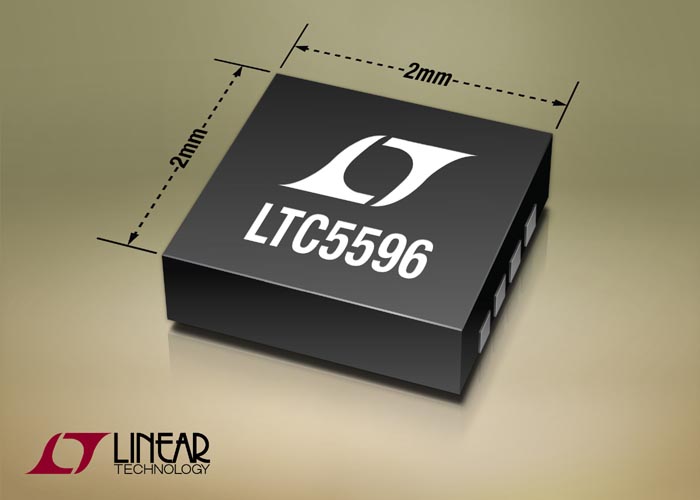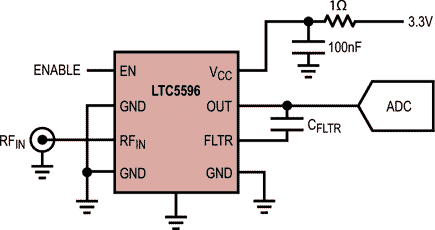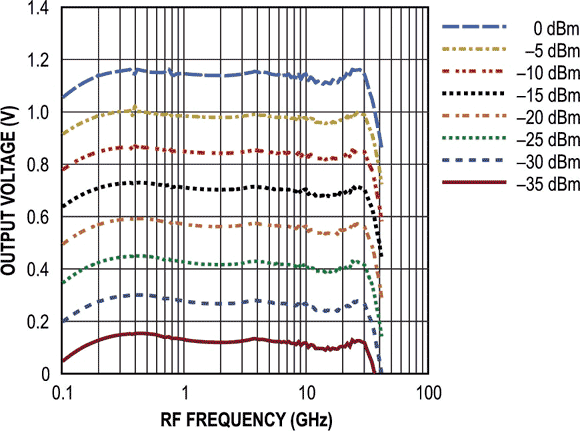Linear Technology introduces the LTC5596, a high frequency, wideband and high dynamic range RMS power detector that provides accurate, true power measurement of RF and microwave signals independent of modulation and waveforms. The LTC5596 responds in an easy to use log-linear 29 mV/dB scale to signal levels from –37 dBm to –2 dBm, at accuracy better than ±1 dB error over the full operating temperature range and RF frequency range, from 200 MHz to an unprecedented 30 GHz. In addition, the device’s response has ±1 dB flatness within this frequency range. A wider frequency range can be used, from 100 MHz to 40 GHz, however with slightly reduced accuracy at the frequency extremes. Its RF input is internally 50 Ω matched from 100 MHz to 40 GHz, making the device very easy to use at any band within its useful frequency range.

Modern 4G and 5G broadband communications systems employ high order, multi-tone OFDM modulation to attain higher desired data rates. Traditionally, microwave Schottky diodes are used as the detector element. They face serious shortcomings when rectifying the RF or microwave signals while measuring only the peak of the waveform, which grossly misrepresents the real power of the signal. In contrast, RMS detectors perform an analog root-mean-square computation of the waveform, then average the result to derive a true power representation of the input signal, regardless of its modulation, number of carriers and varying amplitudes. This capability to measure the true power is critical for equipment manufacturers to set the proper transmit power, ensuring the maximum transmission distance and thus improves TX range while remaining compliant with regulatory power limits.
 |
| 100 MHz to 40 GHz RMS Power Detector. |
The LTC5596’s extraordinarily wide bandwidth allows the detector to work seamlessly across multiple frequency bands using a common design with minimum calibration. For example, the LTC5596 works equally well in a sub-10 GHz backhaul microwave link as with a 28 GHz version. A single design with no recalibration has the potential to provide significant cost savings to equipment manufacturers. Moreover, the LTC5596’s wide frequency range and improved sensitivity enables use in a wide variety of applications such as radar systems, avionics, wireless infrastructure base stations, satellite communications and test instrumentation.
 |
| Output Voltage vs Frequency. |
The LTC5596 operates from a single 3.3 V supply, drawing a nominal supply current of 30 mA. The detector has built-in improved ESD protection. All pins are capable of withstanding up to 3,500 V discharge, human body model. Two temperature grades are available. An I-grade is designed for operation from –40°C to 105°C case. For applications subject to extraordinarily high temperature operating environments such as in high power RF power amplifiers, a high temperature H-grade is offered with rated temperature from –40 °C to 125 °C case. The H-grade is 100% tested over temperature, and is guaranteed to have tight tolerance on its slope and intercept point, reducing part-to-part variations. Both temperature versions are available in a 2 mm × 2 mm plastic 8-lead DFN package.
The LTC5596 I-grade is priced starting at $12.50 each in 1,000-piece quantities, while the H-grade starts at $16.95 each. Both versions are now available in production quantities.
Summary of Features: LTC5596
- 50 Ω Matched Operating Frequency Range 100 MHz to 40 GHz
- Wide Detection Range (200 MHz to 30 GHz) –37 dBm to –2 dBm
- Linear Dynamic Range (< ±1 dB Error) 35 dB
- ±1 dB Flat Frequency Response 200 MHz to 30 GHz
- Operating Temperature (Case)
- I-Grade –40 °C to 105 °C
- H-Grade –40 °C to 125 °C
